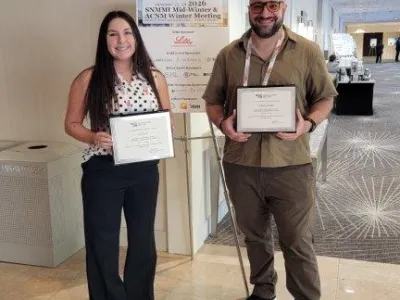Oregon Tech Natural Sciences Assistant Professor Dr. Kerry Byrne received a $41,080 grant from the U.S. Fish and Wildlife Service (USFWS) for “Demographic Monitoring of Naturally Occurring Applegate’s Milk-vetch.” This recent grant award is an expansion on a previous grant from the USFWS, for a total of almost $55,000 towards this research.

The new $41,080 grant allows Dr. Byrne to study wild, native individual plants at multiple sites. As with the other project, she will monitor survival and reproduction of the wild plants and create a population model to predict survival in the future. These data will assist federal, state, and local agencies in planning future population introduction and augmentation plans, and is vital for the recovery of this plant, considered an imperiled species.
With the help of Oregon Tech undergraduates, Dr. Byrne will establish a monitoring plan and conduct thorough demographic monitoring, tracking seedling survival, reproduction, and recruitment. “Through both of these projects we’ll increase the knowledge base about this rare plant while providing Oregon Tech students with an opportunity to participate in a professional fieldwork project,” said Byrne. “I employ 1 or 2 Oregon Tech undergraduate students each summer to help collect the data. I also have an undergraduate doing an independent research project related to the plant. She is looking at the importance of pollinators for seed production in Applegate's Milkvetch.”
Rizka Ongge, an Oregon Tech student from Indonesia who is majoring in Environmental Science, has been doing a research study for 2 years with Dr. Byrne and will graduate this summer after finishing her research credits. “I’m currently doing a pollination study for an endangered flower endemic to Klamath Falls, Applegate’s Milkvetch (Astragalus applegatei),” said Rizka. “In summer 2014, I conducted a pilot study at one population site managed by The Nature Conservancy. The findings from this research shall help to address the first research management objective outlined in the United States Fish and Wildlife Service (USFWS 1998) Recovery Plan for the species. My first research indicates that conservation efforts should focus on increasing allogamy (cross-pollination) in order to ensure the survival of the species. This summer, I expanded my research to include two additional populations (located at the Klamath Falls airport and Miller Island), to determine if the pattern I observed at the first site holds true in the two additional sites.” Upon graduation, Rizka will be moving to Australia to pursue a master’s degree.
Byrne hopes to find other motivated students to conduct independent research projects on the species in the future.
Dr. Byrne has been a member of Oregon Tech’s Natural Sciences Department since 2013. She earned a doctorate in ecology from Colorado State University and is a member of the Ecological Society of America, California Native Plant Society, and Native Plant Society of Oregon.
Since July 1, 2015 Oregon Tech has been awarded $1,848,323 of new funding from federal, state and private entities, which includes federal funding of Oregon Tech’s TRiO Program.
Image: Applegate's Milkvetch. Photo credit: Melissa Carr









